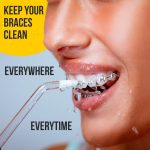Let’s talk through the procedure. Generally, it is safe to treat small tooth bleeding at home. Proper dental hygiene and natural remedies effectively avoid bleeding gums and prevent infection. Gum bleeds are usually not serious. Users will notice that their teeth are irritated with blood when brushing and flossing, which could cause gum inflammation. Most people who get gum disease develop plaque buildup. This substance allows bacteria to grow around the gum line. It would help if you kept a clean mouth to avoid irritation and bleeding.
Why are my gums bleeding so suddenly?
When a person has bleeding gum, it is caused by plaque gathered near their gums. Plaque is filled with bacteria that attack the tissues surrounding teeth. When plaque forms, the gum becomes irritated or inflamed. They are often bleeding, which can cause periodontal problems.
Why do my gums bleed every morning?
Bad oral hygiene is the cause of bleeding gums in the morning. If you are lazy and forget to brush your teeth and gums before sleep, you will get a big populate of bacteria while you sleep. While you sleep, you don’t wash your teeth with saliva. Nothing prevents the reproduction of harmful microbes. Therefore, in the morning, the inflammation of the gums increases.
Causes of bleeding gums.
There are many causes of bleeding gums. One of the most common causes is inflamed gums. This can be caused by a buildup of plaque on the teeth. Another cause of inflamed gums is vitamin C deficiency. Gums may also bleed if they are damaged by smoking.
Risk factors for developing gum disease
Some people can develop gum infections from gum disease in San Diego, California. Some people may have inherited periodontal diseases from their genetic background. During age, the chance that gums develop can be increased. Stress: Stress can cause periodontal issues because the bacteria in your gums are harder to treat than other bacteria. Smokers risk gum disease more often than those that do not smoke. I am sorry for this inconvenience! If your oral health has not been maintained properly, plaque buildup can cause gum damage.
Signs of gingivitis
Bleeding gums can cause gingivitis. Other signs associated with early gum disease are red, swollen gums. Dental Express dental experts are here to take care of your dental care needs to help you prevent gum disease to more advanced and damaging levels. If gums have been damaged, they can become pockets between teeth and gums where harmful bacteria can enter them. It causes teeth as well as bone loss.
Pregnancy
Almost all pregnant women experience painful bleeding gums when brushing and flossing, due to hormonal changes during pregnancy. During pregnancy, hormone changes can alter the sensitivity of a baby to bacteria causing gum disease, leading to an increased risk of gum disease. Make sure you maintain good oral health while preparing for pregnancy to prevent gum disease in your baby.
Wearing dentures that fit incorrectly.
A poorly fitting denture can cause gums to bleed, and this can cause soreness. If one has a habit of wearing dentures in bed, their gum tissue can start bleeding. A denture is essential for maintaining good oral health and preventing tooth resorption, as it can cause bleeding gums and lead to tooth decay.
When should I be concerned about bleeding gums?
If you notice that your gums are bleeding more easily when you brush or floss your teeth, it is essential to take this as a sign that your oral hygiene may need to improve. While there are many causes of bleeding gums, one of the most serious is periodontal disease. This is why it is essential to see your dentist if you are concerned about bleeding gums so that they can determine the cause and provide you with the appropriate treatment. In the meantime, be sure to brush and floss regularly and use a soft-bristled toothbrush to avoid further irritation.
Are bleeding gums serious?
Usually, gum bleeds are minor and are not severe. When you brush your teeth or floss, you may feel blood on your gums may upset them. Symptoms of gum disease are usually caused by plaque build-up. This material allows bacterial growth to grow along the gum line.
How do I get to stop my gums bleeding?
Oral care is very influential for all parts of your body. That’s why you should follow up on our recommendations.
- Rinsing with hydrogen peroxide should work well. Please do not smoke anymore.
- Reduce stress levels.
- Take more vitamin C and vitamin K.
- Scrub your tongue when you’re brushing.
- Schedule an appointment with the dentist at least twice per year.
- Use an electric toothbrush to brush your teeth at least twice a day.
- Flossing is very great to treat gum disease. Use water flosser after each other meal.
Keep your teeth clean. Bleeding gums can indicate dental hygiene issues.
How does a poor diet impact your gums?
Occasionally, processed products may irritate your teeth and gums, causing bleeding and gum inflammation. Do you avoid refined foods and fatty foods, or eat foods with high sugar?
Nutrition is all about finding the right balance when it comes to a healthy diet. As we’ve seen above, even fruits and vegetables contain natural sugars and vitamin K, which can cause gingivitis and damage teeth. But this doesn’t mean that you should permanently cut them out of your diet.
However, how can I choose meals that promote good medical conditions? It is worth noting that a well-balanced diet is characterized by two main features: variety and moderation. You should stick with the five main food groups and forget fad diets, as it can lead to vitamin deficiency.
- Calcium-rich food, such as cheese and yogurt with greens or almonds, help to protect and rebuild tooth enamel.
- Foods rich in protein – Meat, poultry, and fish provide your body with minerals that are important for the development of strong teeth.
- Vegetable fruits and vegetables – They work hard to protect teeth from decay by neutralizing acidic substances and reducing food particles on your teeth.
- Water wins in terms of a good drink choice, water is the best option. Not only is it naturally detoxifying you, but unfiltered water has the most beneficial properties. It also contains an abundance of minerals that make it the most safe drink for your teeth.
A well-balanced diet rich in vitamins and minerals not only improves your overall health, but is also important in preventing oral diseases. In case of doubts about the impact of your diet on your health, you should contact a dental health professional for help.





